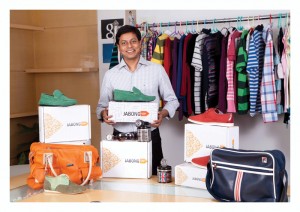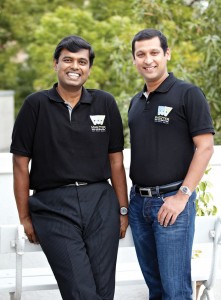Have you always dreamt about starting your own business? Have you wanted to be your own boss? Did you ever fantasise about seeing your company on the Fortune 500 list? In this month’s cover story we interview four young entrepreneurs who had similar dreams and pursued them to start their own companies.
India’s Internet user base has gone up exponentially over the last five years. E-commerce is finally up and thriving and the evolution of e-commerce has come a full circle with marketplace models taking centre stage again. We reveal the faces that are behind India’s successful and popular online brands. They give us their views on education, their business ideals and lessons that they learnt on the road to success. Read on as they share secrets and give entrepreneurial tips that might enable you to become the next ruler of the e-commerce kingdom.
 DEEPINDER GOYAL FOUNDER OF
DEEPINDER GOYAL FOUNDER OF
Zomato.com
Discover more places to eat around you
HIS BUSINESS
Zomato.com is a website providing information related to restaurants, bars, pubs and clubs
EDUCATION
Integrated master’s degree in maths and computing from IIT Delhi
EUREKA MOMENT
Seeing colleagues lining up at the cafeteria to view stacks of menu cards
BUSINESS PHILOSOPHY
Get things done
START-UPS HE LOVES
Dropbox, Kickstarter, WhatsApp
BIGGEST CHALLENGE A START UP FACES
HIRING, FUNDING
How much did your education contribute to your becoming an entrepreneur?
The one thing that IIT Delhi taught me was how to get things done, more than just the technical education. My biggest takeaways from IIT are focus, persistence and follow-through.
When did you realise that there was a space for a company like Zomato?
Back in 2008, I was working at Bain and Company, one of the largest management consulting firms in the world. At Bain, I noticed that my colleagues used to line up to view the stack of menu cards in the cafeteria during lunch hour. There was a rule that you cannot take the menus to your desk since people generally ended up losing them, causing inconvenience for everyone.
Looking at the queue, and to save the trouble for everyone, I just scanned these menus and put them online for everyone to use. This small intranet website started getting a substantial number of hits from people within Bain. That was when we realised we could build a business out of this. That is how Zomato was born.
How important is it to have a background in the business you start?
Since we are in the domain of consumer technology, having a technical background has definitely been a major asset to us. What one also needs to understand is that you don’t need to know all the answers when you start out, but an entrepreneur needs to have the innate curiosity to learn the various aspects of their domain as they go along, as well as hire a strong team of talented individuals who will feel just as passionately about your product as you do.
DETOX MANTRA
I TAKE A BREAK AND TRAVEL WITHOUT MY LAPTOP.
What’s the one thing about being an entrepreneur that you learnt the hard way?
Hiring the right people.
How has success changed the way you work?
I think the reception we have got so far only makes us try even harder to create a product that our users like.
We are all the more driven to create a world-class product with lesser room for error.
BEST WAY FOR A START UP TO GET FUNDING:
BUILD A GREAT PRODUCT
How much of your personality is reflected in your company?
‘Get things done’ is the bedrock of our culture here at Zomato. Going the extra mile and doing more than you’re required to, often on a very tight deadline, is something that comes naturally to everyone here. It’s an ethos we very strongly support, and it’s encouraging to see it permeating throughout the organisation.
Are there specific traits you look for while hiring people for your company?
We look for individuals who are actually passionate about the role that they want to take up at Zomato. We are a group of people who love our work, and that stems from the passion we have towards Zomato and also the joy we derive from what we do. Besides their passion for the company, we look for qualities like ethics, respect, attitude and skills – in that order.
A BOOK EVERY ENTREPRENEUR SHOULD READ
“HOW TO STOP READING BOOKS AND MOVE YOUR ASS”
How can you tell when the business isn’t working? How much time should you give your start up before you decide it’s time to pull the plug?
Depends when your patience runs out. Generally, however, when you are about to give up, you are always two feet from gold.
How can you tell if one is cut out to be an employee or an employer?
In a growing organisation, there is place for both kinds of people. You cannot identify this in a course of an interview. You figure this over a period of time. When it happens, you have to put the right people at the right place in the organisation.
IN WHICH INDUSTRY DO YOU SEE MAXIMUM GROWTH POTENTIAL FOR YOUNG BUSINESSES?
OF COURSE, INTERNET
 PRAVEEN SINHA
PRAVEEN SINHA
CO-FOUNDER OF JABONG.COM
HIS BUSINESS
Jabong.com is one of India’s leading fashion and lifestyle ecommerce portals. It retails apparel, footwear, accessories, beauty products, fragrances, home accessories and other fashion and lifestyle products.
EDUCATION
Engineering from Delhi College of Engineering
EUREKA MOMENT
The acceptance of e-commerce in India. “We observed this and at that point of time we thought that fashion would be a profitable sector to be in, because the timing in terms of internet presence and user familiarity was just right”, says Sinha.
START-UPS HE LOVES
Google, Facebook and LinkedIn
BUSINESS PHILOSOPHY
Create value for the stakeholders and create employment, create return on investment, create professional satisfaction and growth for the employees and create customer delight
THE INDUSTRY WITH MAXIMUM POTENTIAL FOR YOUNG BUSINESSES
HEALTHCARE, EDUCATION AND E-COMMERCE
How much did your education contribute to your becoming an entrepreneur?
I don’t think a degree at a college is necessary to becoming an entrepreneur. I have seen a lot of people without a degree doing really well. If you start off on your own, you end up learning from mistakes or through experience, while an education teaches you how to execute certain things without having to commit mistakes. It makes the learning curve easier. [A degree] allows you to understand risk very well; so many people with a good education will weigh all the risks before diving into a business.
BIGGEST CHALLENGE AN ONLINE START UP FACES: FUNDING
With a number of competitors entering the e-retail space (Myntra, Yebhi, Zovi, etc), how do you ensure your business has the strongest brand recall among customers?
If you have more players it proves that it’s a bigger market, be it automobile or retail. Having said that, there is always a market leader and when we started there were already existing players but we saw the opportunity to create our presence in a very positive way. Today we have more than 80,000 options on our website in the lifestyle category which is not comparable to the others. We improved on customer experience. For example the promptness of delivery – we ensured that we could deliver products to certain areas on the same day or the next day. Another thing was all the companies gave the customers a 30-day return policy but none of the delivery guys allowed you to check the product on delivery, so we started that as well. We realised that size, look and feel is an important variable so we gave that experience to the customer. We also started swipe on delivery and quick exchange. So it was a combination of all these small initiatives that we started to ensure that the customer feels the difference when they do business with us.
A BOOK EVERY ENTREPRENEUR SHOULD READ
IT DEPENDS, FOR INSPIRATION IT WOULD BE STAY HUNGRY, STAY FOOLISH BY RASHMI BANSAL; IF YOU NEED TO MAKE TOUGH DECISIONS THEN YOU NEED THE BHAGAWAD GEETA
How do you know if you’ve come up with a great dotcom idea?
There are two ways to work. Many ideas are run by self belief. There are a lot of entrepreneurs who did not know how much money they would make. But their belief in the product pushed them to create something that users liked. Then there is also a rational and analytical way to look at it, which is to ask what problem am I solving or what delight am I creating? Will customers pay for it? How scalable will that be? How much time will that require? How much investment? You need to do a thorough sanity check while removing your attachment to the idea.
BEST WAY FOR AN ONLINE START UP TO GET FUNDING
COME UP WITH SOMETHING THAT’S NEW AND SCALABLE
DETOX MANTRA
I LOVE WALKING, ESPECIALLY WHERE THERE IS LOT OF GREENERY
Is there potential for young fashion brands to use Jabong.com as a platform to sell their products?
Of course, we have a created a platform where small and big entrepreneurs can enter. Though there are two parts to this. One is product development, second is selling. The good news for the entrepreneur is that if he/she is really good in product designing and manufacturing, then the second part is taken care of. But they should fulfil the criteria of our listing; they should be of the right quality and the right price.
What’s the one thing about being an entrepreneur that you learnt the hard way?
I keep making mistakes. But one thing I learnt though was to keep your pitch ready because it is not easy to attract the best talent to a start-up. And some advice I would give is that whatever you thought and planned in terms of timelines and cash, multiply it by two or three. It might reduce, but it pays to create a buffer.
HIS BUSINESS
Magzter is a global digital magazine store and newsstand. Magzter has gathered 1.1 crore users in just 2 years and is growing at a rate of 7-8 lakh new users every month. “We are well on our way to becoming a billion dollar company in the next few years!” says Ramdas
EDUCATION
Mechanical engineering from College of Engineering, Chennai
EUREKA MOMENT
When he created a magazine app for his publication Galatta Cinema and received 100,000 downloads in one year
START-UPS HE LOVES
Pinterest, Skype, Instagram
BUSINESS PHILOSOPHY
Focus is God
(L to R) Vijayakumar Radhakrishnan and Girish Ramdas, co-founders of Magzter
How much did your education contribute to your becoming an entrepreneur?
I believe that my schooling and college made me confident about myself and engineering gave me an analytic thinking mind which I used to my advantage.
When did you realise that there was a space for an online company like Magzter?
I used to run a software company [Dot Com Infoway Limited (DCI)] with my business partner, C. R. Venkatesh, which used to create software and then apps, and a magazine media company called Galatta.com. My co-founder and President in Magzter, Vijayakumar Radhakrishnan, who used to head our app development and technology in DCI, and I set out to create the first magazine app for iPhones for our own magazine Galatta Cinema in 2009. In one year we had 100,000 downloads – we then realised that if just one magazine can get 100,000 downloads in just one year, then what if we create something that can cater to ALL magazines of the world! This is what prompted us to create Magzter in 2011.
INDUSTRY WITH MAXIMUM POTENTIAL FOR YOUNG BUSINESSES:
EDUCATION (EVEN MAGZTER IS GEARING UP TO INCLUDE TEXTBOOKS, ETC) AND HEALTH
What’s the biggest challenge Magzter had to overcome?
Being a newcomer in a 100-year-old industry, the biggest challenge was to get the top publishers to sign up with Magzter. It took more than 9 months to get our first major publisher and then it no longer was a challenge.
How much of your personality is reflected in your company?
My personality is to be meticulous, focused and aggressive without showing off. This is how I run Magzter. We put a lot of attention to detail and are technology and consumer focused to become the #1 reading platform in the world and we are well on our way to doing it. All this while not boasting about it and letting the merits of Magzter speak for itself.
BIGGEST CHALLENGE AN ONLINE START-UP FACES
USUALLY, MOST START-UPS HAVE GREAT IDEAS BUT THEN SUCCESSFULLY EXECUTING THE IDEAS AND COMMERCIALISING THEM AS WELL AS CAPITAL ARE THE BIGGEST CHALLENGES
What are your thoughts on the future of print magazines in India? Do you see it impacting your business in the future?
In most global geographies, print is in decline – first it was newspapers then it is magazines and then books – the rise of digital is inevitable. Surprisingly, in developing countries like India, since literacy levels are still rising, there is still a rise in print but due to the rise of tablet and smart devices, we are hugely confident that our future is very bright.
BEST WAY FOR A START-UP TO GET FUNDING
MAKE A BUSINESS PLAN AND MEET AS MANY VCS [VENTURE CAPITALISTS] AS POSSIBLE – I USUALLY DON’T SUGGEST ANGEL FUNDING
How important in the business equation are the people you employ? How much of a difference can they make?
Our people are our main asset. We spend a lot of time to hire the best possible people in each field, keeping in mind the cash constraints of any start-up business. But we are also rolling out employee stock option plans and other benefits to retain our employees. People can make or break any company.
A BOOK EVERY ENTREPRENEUR SHOULD READ
REALITY CHECK BY GUY KAWASAKI
How do you convince an established brand to come aboard a start-up?
Convincing the first major brand was quite difficult but when we met the top team from the brand and showcased Magzter to them, they loved it and then signed up. Now we have all the world’s top magazines on Magzter!
What do you keep in mind while selecting a business partner?
Competence and ethics are the most critical – the main things we see in any business partner. We also do thorough background checks before we start working with any business partner.
What are the core pillars of an online business?
Customer focus. User Experience. Customer confidence.
DETOX MANTRA
I USUALLY RUN 5-10 KM A DAY AND ON SOME RARE WEEKENDS WHEN I’M IN CHENNAI I GET TOGETHER WITH A GROUP OF MY CEO FRIENDS TO GO COMPUTER GAMING
HIS BUSINESS
Shaadi.com is the pioneer of online matchmaking in India for those looking to get married
EDUCATION
MBA in operations and strategic management from Boston College
EUREKA MOMENT
Meeting a matchmaking broker who went door to door with ‘resumés’
START-UPS HE LOVES
Google, Shaadi.com,
Redbus
BUSINESS PHILOSOPHY
No.1 is your product proposition, and then comes potential market size and finally unit economics
How much did your education contribute to your becoming an entrepreneur?
My education is actually entirely responsible for me being an entrepreneur although in a perverse way. As a college student in India, I never saw value in the kind of education that was being imparted in commerce, arts and science degrees. I spent most of my time attempting novel business ideas, which invariably failed. That is when I decided to move to the [United] States. I lived there for ten years, and started to think for myself, play the devil’s advocate, and back my own ideas with reason and logic. These are key attributes for any entrepreneur and I might not have developed them, had it not been for my disenchantment for the education system in India, or at least my experience of it.
INDUSTRY WITH MAXIMUM POTENTIAL FOR YOUNG BUSINESSES
CLEARLY, DIGITISATION AND THE INTERNET HAVE THROWN UP IMMENSE OPPORTUNITIES TO BUILD BUSINESSES IN A CONNECTED WORLD. THESE BUSINESSES ALSO REQUIRE LESSER CAPITAL AND CAN BE BUILT ON MERIT ALONE
When did you realise that there was space for a company like Shaadi.com?
In 1996, there was a lot of buzz about the Internet in India. That’s when I came across a professional matchmaker in India and his business model intrigued me. He went from door to door within his community, to people he knew, and carried ‘resumés’ with him. Essentially, the choice of a life partner was determined by how far the matchmaker could travel and how much weight he could carry. I wondered what would happen if we took away the spatial and geographical limitations away by putting up profiles on the Internet. Thus, Shaadi.com was set up.
How do you know if you’ve come up with a great dotcom idea?
That’s a $1b question! Frankly, you don’t really know whether or not you have come up with a great idea in the early stages. You might have the conviction and you might even be stupid enough to actually flog a bad idea hard enough that you end up making it work, but when you start you don’t really ‘ know’. Are [young entrepreneurs] doing it because it’s cool? Are they doing it because somebody else is? Or are they doing it because they really think there is a problem out there that they can solve better than anybody else? If one can identify a problem before someone else does, pursue the solution with all the passion they can muster, and if the potential market is large enough, it makes for a great dotcom idea.
BIGGEST CHALLENGE AN ONLINE START UP FACES
GETTING INITIAL TRACTION FROM THE USERS
BEST WAY FOR A START UP TO GET FUNDING
BOOTSTRAPPING AND KEEPING COSTS NEAR ZERO UNTIL THEY ARE ABLE TO GET SUFFICIENT USER TRACTION. ANGELS & ACCELERATORS ARE OTHER SOURCES
What is the one thing about being an entrepreneur that you learnt the hard way?
In India, it takes 3x the time you think it will, 5x as hard as you think it will be and 10x as lonely as you can imagine.
What tips would you offer young entrepreneurs on the effective use of social media and other digital platforms to leverage one’s business?
Today, when we put up a video on YouTube, we get half a million views in a matter of days. That is an incredible multiplier effect. The key is to not abuse this power. You have to continue to develop the proposition that made people follow you in the first place, as opposed to simply trying to promote your brand. If you take your users for granted at any time, the follower base will disappear as fast as they appeared.
A BOOK EVERY ENTREPRENEUR SHOULD READ
VISION 20/20 BY STAN DAVIS AND BILL STEVENSON
If your employees were to describe you as a boss, what do you think they would say?
That’s a tough one! (Laughs) I am not sure of the various adjectives they would use but I do know one thing – they would call me highly demanding. In my view, being demanding is an imperative that all good bosses must keep in mind not just in the interest of their organisations but also in the interest of their subordinates. Years later people remember the bosses they developed the most under, not the ones who were nicest to them. However, one cannot be tough at the cost of compassion.
How can you tell when your business isn’t working?
I am the ‘never say die’ kind of entrepreneur as I am sure most others are. As a team, we have brought all our businesses from the brink of extinction to highly valuable companies at some point or the other. Even when our investors had written the companies off, we persevered, so I think it boils down to the market you are in and the strengths you have.
DETOX MANTRA
GYM, MOVIES, TRAVEL, PARTIES
TRICKS OF THE TRADE
Want to start your own business? Ruling entrepreneurs of the dotcom world share insider tips, advice and business philosophies to catapult your company towards success
 “Ideas never die, people around kill it. Never give up, only give up when you think you cannot do it anymore. So a reality check is more important because ideas need to be constantly tweaked. Have you truly given your best or is it the last part of the chain that you need to cross? Every entrepreneur goes through a phase where he feels that nothing is working for them, but then if you wait it out and learn quickly, you can always recover.”
“Ideas never die, people around kill it. Never give up, only give up when you think you cannot do it anymore. So a reality check is more important because ideas need to be constantly tweaked. Have you truly given your best or is it the last part of the chain that you need to cross? Every entrepreneur goes through a phase where he feels that nothing is working for them, but then if you wait it out and learn quickly, you can always recover.”
– Praveen Sinha, co-founder, Jabong.com
“It [differentiation between brands] comes from being able to capture space in a consumer’s mind. How do you do that?
You can’t do that through one campaign or through one feature because that can be replicated. I really have to do it through fundamental values and principles that are imbibed within the organisation, and therefore in everyone, in every product feature and in every communication that’s put out there.”
– Anupam Mittal, founder, Shaadi.com
“I once overhead someone say, ‘Mediocrity is a disease, excellence is a habit’. If you have a start-up that is doubling in size every quarter, hiring must be the most important as well as the most difficult part of your job. The pressure to hire right makes the job all the more stressful. Nobody likes making mistakes (especially recruiting ones).”
– Deepinder Goyal, founder,
Zomato.com
“It’s all a matter of demand and supply. I believe we need to give the BEST shot at any business we create and run, but when it does not make commercial sense to continue it, it would be best to quit but not before we run out of all avenues to save the business or even sell it out.”
– Girish Ramdas,
co-founder, Magzter.com
Volume 3 Issue 2































